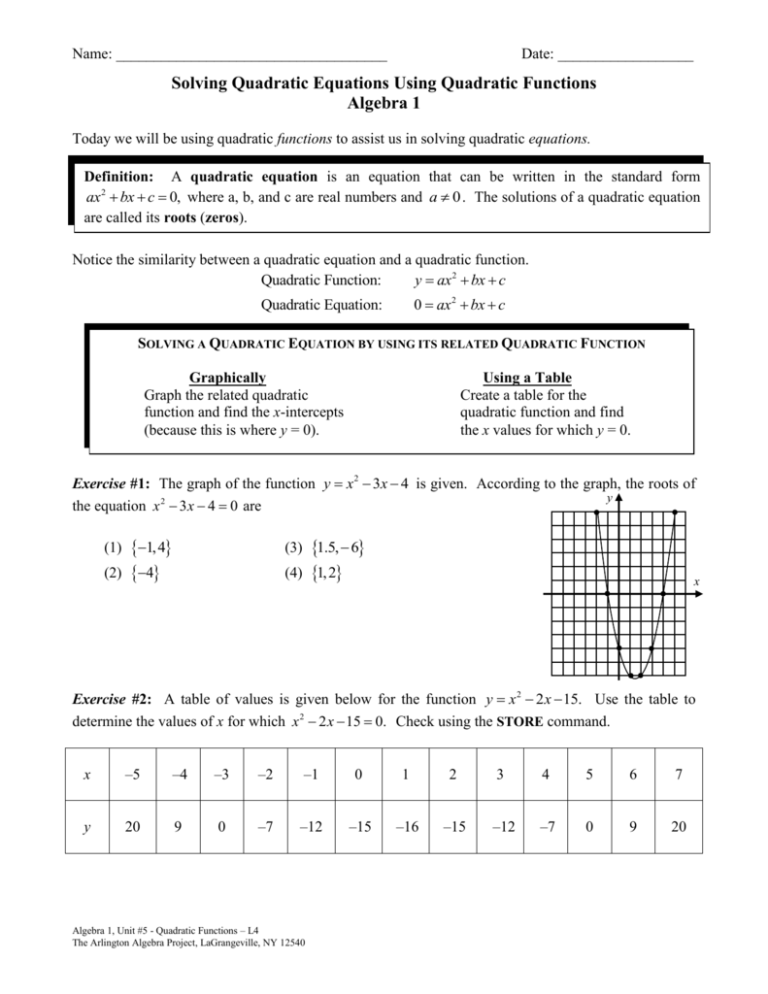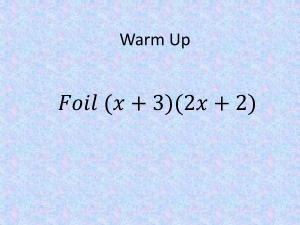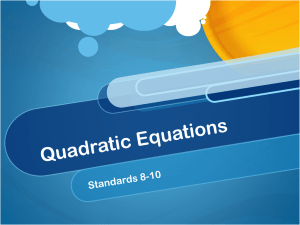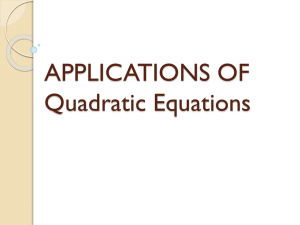L4.Solving Quadratic Equations Using Quadratic Functions
advertisement

Name: ____________________________________ Date: __________________ Solving Quadratic Equations Using Quadratic Functions Algebra 1 Today we will be using quadratic functions to assist us in solving quadratic equations. Definition: A quadratic equation is an equation that can be written in the standard form ax 2 bx c 0, where a, b, and c are real numbers and a 0 . The solutions of a quadratic equation are called its roots (zeros). Notice the similarity between a quadratic equation and a quadratic function. Quadratic Function: y ax 2 bx c 0 ax 2 bx c Quadratic Equation: SOLVING A QUADRATIC EQUATION BY USING ITS RELATED QUADRATIC FUNCTION Graphically Graph the related quadratic function and find the x-intercepts (because this is where y = 0). Using a Table Create a table for the quadratic function and find the x values for which y = 0. Exercise #1: The graph of the function y x 2 3x 4 is given. According to the graph, the roots of y the equation x 2 3 x 4 0 are (1) (2) (3) 1.5, 6 1, 4 4 (4) 1, 2 x Exercise #2: A table of values is given below for the function y x 2 2 x 15. Use the table to determine the values of x for which x 2 2 x 15 0. Check using the STORE command. x –5 –4 –3 –2 –1 0 1 2 3 4 5 6 7 y 20 9 0 –7 –12 –15 –16 –15 –12 –7 0 9 20 Algebra 1, Unit #5 - Quadratic Functions – L4 The Arlington Algebra Project, LaGrangeville, NY 12540 Exercise #3: Find the zeros of the function y x 2 3x 54 numerically by using a table of values. Create the table with your graphing calculator. Exercise #4: The graph of a particular function of the form y ax 2 bx c, where a, b, and c are real numbers, is shown below. Use the graph to answer the following questions. y x (a) Is the numerical value of a positive or negative? Justify. (b) State the numerical value of c. (c) State all solutions to each equation below: (i) ax 2 bx c 0. (ii) ax 2 bx c 3. Exercise #5: Using the accompanying grids, sketch graphs of functions of the form y ax 2 bx c that satisfy the given criteria. (a) ax 2 bx c 0 has two roots; a 0 (b) ax 2 bx c 0 has exactly one root; a 0 y y y x Algebra 1, Unit #5 – Quadratic Functions – L4 The Arlington Algebra Project, LaGrangeville, NY 12540 (c) ax 2 bx c 0 has no roots; a 0 x x Fact: A quadratic equation can have 0, 1, or 2 solutions. Exercise #6: Determine the roots for each quadratic equation given below by using your graphing calculator. If the equation has no roots, then so state. (a) x 2 x 6 0 (b) x 2 6 x 9 0 (c) x 2 4 x 6 0 Exercise #7: Which of the following functions has two zeros? (1) y x 2 7 x 14 (2) y x 2 10 x 25 (3) y x 2 5 x 6 (4) y x 2 4 Exercise #8: If one x-intercept of the graph of a quadratic function is 4 and the axis of symmetry has equation x 3 , then what is the other x-intercept? Exercise #9: Which table below illustrates a quadratic function with a maximum value of zero? (1) (3) (2) (4) Algebra 1, Unit #5 – Quadratic Functions – L4 The Arlington Algebra Project, LaGrangeville, NY 12540 Name: ____________________________________ Date: __________________ Solving Quadratic Equations Using Quadratic Functions Algebra 1 Homework Skills 1. The graph of y x 2 6 x 8 is shown. The roots of the equation x 2 6 x 8 0 are y (1) (2) 8 2, 4 (3) (4) 3 1 x 2. Which of the following graphs illustrates a quadratic function that has no real zeros? (1) (3) y y x (2) x (4) y y x x 3. Determine the zeros for each quadratic function given below by using your graphing calculator. If the function has no zeros, then so state. (a) y x 2 3x 10 (b) y x 2 5 x 6 (c) y x 2 8x 16 (d) y x 2 2 (e) y x 2 2 x 4 (f) y 25 10 x x 2 Algebra 1, Unit #5 - Quadratic Functions – L4 The Arlington Algebra Project, LaGrangeville, NY 12540 4. A table of values is given below for the function y 27 6 x x 2 . Use the table to determine the values of x for which 27 6 x x 2 0. Check by using the STORE command. x –10 –9 –8 –7 –6 –5 –4 –3 –2 –1 0 1 2 3 4 y –13 0 11 20 27 32 35 36 35 32 27 20 11 0 –13 5. How many roots does x 2 7 x 6 0 have? (1) 1 (2) 2 (3) 3 (4) 0 Reasoning 6. If the two x-intercepts of the graph of a quadratic function are 3 and 9, then the equation of the axis of symmetry is (1) x 6 (2) x 1 (3) x 3 (4) x 4 7. If one x-intercept of the graph of a quadratic function is 4 and the axis of symmetry has an equation of x 7, then what is the other x-intercept? 8. The graph of a particular function of the form y ax 2 bx c, where a, b, and c are real numbers, is shown below. Use the graph to solve each of the following equations. y x (a) ax 2 bx c 0 (b) ax 2 bx c 1 Algebra 1, Unit #5 – Quadratic Functions – L4 The Arlington Algebra Project, LaGrangeville, NY 12540 (c) ax 2 bx c 3








